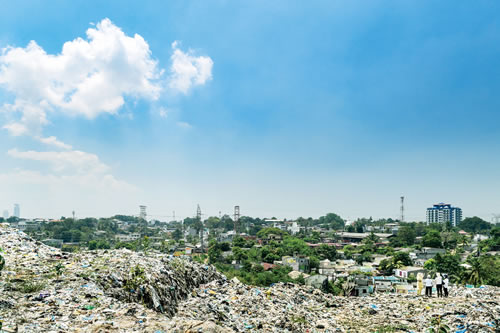
As an economy grows, it unavoidably means having to deal with the problem of waste.
Appropriate waste management systems reduce the burden on the environment and help create a sustainable,
sound material-cycle society. Using its knowledge and technology, Japan is working closely with developing countries to solve the serious problem of garbage.
Key Resource Person: Mitsuo Yoshida, International Network for Environmental & Humanitarian Cooperation (iNEHC), Non-Profit Inc. Assoc.
Photography: Yusuke Abe
If the problem is ignored,
tragedy will eventually strike
Waste generation is a natural consequence of people living their daily lives. In Japan, for example, each individual generates about a kilogram of waste per day, which amounts to 365 kilograms per year. Due to increased concern for the environment, Japan has successfully reduced its annual volume of waste since 2000; however, looking at the history of developed countries, the statistics make it clear that as economic development progresses, the amount of waste also increases. As a country develops, production activities accelerate, and imports increase as well, so the amount of waste naturally increases. Therefore, becoming prosperous can be equated to producing abundant waste.
In developing countries, even modest economic growth may lead to a sharp increase in the amount of waste—sometimes more than double—making it very hard for waste collection services and the construction of disposal sites to keep pace. In the worst cases, the waste is left mostly untreated.
Mitsuo Yoshida, Director of the International Network for Environmental & Humanitarian Cooperation, has been involved in the waste management sector of JICA for more than 20 years. In the case of developing countries, he says that "Some countries and regions fail to provide proper waste services due to challenges such as having a wide coverage area. However, the biggest problem is that waste management is not prioritized enough as a policy issue. This will lead to limited budgets for human resource development and appropriate management system development.
Proper waste management in a low-income city is said to require five to ten times the expenditure that is currently spent per person. Although it goes unspoken, many governments would rather invest in more visible things such as infrastructure development.
Experts agree that once economic development reaches GDP per capita $2,000-$3,000, the waste collection rate rises considerably. At this point, people will notice if it is left uncollected, often triggering strong calls from the public for sanitation measures.
On the other hand, waste disposal sites tend to be located away from urban areas; this means politicians, and those in the position to allocate budgets, barely understand the situation on the ground. As a result, open dumps, where garbage is simply thrown and piled up in vacant lots, valleys, depressions, and other places, are becoming widespread; and leachate from waste disposal sites, as well as methane gas produced in anaerobic environments, have become pollutants.
"Another serious problem is the risk of collapse of waste mountains. In 2000, this has resulted in the death of more than 300 people in Manila, the Philippines; and in 2017, 32 people lost their lives in Colombo, Sri Lanka, 46 in Addis Ababa, Ethiopia, and 16 in Maputo, Mozambique. Despite the large-scale urbanization caused by economic development, not everyone can find work, so the poor make a living by picking up valuable items from these piles of garbage, and illegally residing near waste disposal sites. These factors create a vicious cycle."
Working hand-in-hand
to support development
The development of waste management in Japan can be broken down into four stages: 1) the improvement of public health through waste collection; 2) the reduction of environmental impact and prevention of pollution through proper waste disposal at landfills; 3) the reduction of landfill waste through the introduction of intermediate waste treatment; and the current stage, 4) the creation of a sound material-cycle society through the 3Rs (reduce, reuse, recycle). Japan worked on 2) and 3) simultaneously in the 1960s; and by constructing waste incineration facilities, it greatly reduced the amount of its landfill waste.
Nevertheless, these processes cannot simply be applied as-is to waste management in developing countries. Rapid economic growth with mass consumption and globalization has led to shortened transitions times between stages, and in some cases, the process of development needs to be considered as working simultaneously in multiple stages.
"The trend in waste management is shifting toward recycling of materials and energy recovery through incineration. However, it is up to developing countries to choose which path to take. They have the opportunity to learn from the experience of different countries and consider their own waste problem, while Japan can also play the important role of offering its most recommended measures for achieving whatever they decide on."
The recommendations will vary depending on the geographical conditions, environment, and culture of the country, and even the size of the cities within the same country. JICA extends its cooperation and wants to work together with each country from the latter's perspective.
One of the local Sri Lankan officials introduced in this special feature states, "I appreciate Japan's cooperation. More than that, though, I'm happy that I was able to become familiar with the Japanese principle of Mottainai, which conveys a sense of regret over creating waste. I'm very thankful." Hopeful words indeed. Let's work together as people of a shared world, so we can put a smile on the face of future generations!




scroll